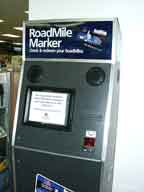Article
One for the Road
A kiosk rollout has brought together 300,000 truckers earning loyalty rewards at truck stops.
April 4, 2004 by James Bickers — Editor, Networld Alliance
A truck stop might be an unexpected spot to find an innovative, high-tech kiosk deployment. But that's exactly what is in place at the 160 locations operated by Travel Centers of America, and 300,000 American truckers have signed up to use the kiosks.
For the operators of commercial fueling centers, a constant challenge is customer loyalty. America's highways are filled with places to stop for fuel, food, rest, and even a shower. Travel center operators are always seeking creative ways to lure truckers to their locations.
Of course, many chains operate loyalty programs. Truckers earn points for spending at the pump, and use those points to buy snacks, drinks, a meal, or anything that the store sells.
Take the "Road King Club" program, operated by Westlake, Ohio-based Travel Centers of America. For every gallon of diesel fuel a driver purchases, it earns him one "road mile."
The road miles have a value of one cent, and can be redeemed at the store, restaurant or shop, said David Hanzal, loyalty program project manager for Travel Centers of America. "A typical fuel fill-up for most drivers is 125 gallons, so if he fuels up he's earning about $1.25 on his account. He might save those up over a week's time and earn himself a nice steak dinner at the end of the week."
 Until last September, the Road King Club program was paper-based, and truckers had to keep track of their points with slips of paper. The new kiosk-based program eliminates the paper trail and has been immensely popular in its first six months.
Until last September, the Road King Club program was paper-based, and truckers had to keep track of their points with slips of paper. The new kiosk-based program eliminates the paper trail and has been immensely popular in its first six months.
Truckers use a bar-coded "loyalty card" to access the kiosks. Once logged in, they can check point balances and redeem points. When a trucker redeems his points, a certificate is printed that can be used like cash at the register. Previously, the trucker had to keep track of separate slips of paper containing points, and a cashier handled the paper storm of slips being redeemed.
Hanzal said that Road King points can also be used for long-distance calling minutes. Travel Centers also runs occasional contests, and customers can see their entries on the kiosks. In the future, Hanzal plans to make the kiosks a revenue producer by selling advertising on the kiosks.
Revolutionary rollout
The software for the kiosk program was provided by Apunix, a company that has provided kiosk software for grocery store chains and rental car centers.
The Travel Center/Apunix kiosks were one of the largest Linux deployments the industry has seen. The software for the machines was coded in Java, and launched on the Linux platform.
According to Apunix vice president Sylvia Berens, the deployment was unique from another standpoint: the entire rollout took place on a single day, September 19, 2000.
"They were all deployed simultaneously," Berens said. "It's a very interesting project from a number of points of view. First of all, all development for the software was done remotely. We never were at the customer's site. Then, what makes it even more interesting is that all the software was loaded remotely. The kiosks were sent out preconfigured, plugged in by the local gas station, and they were turned on simultaneously. The content was then uploaded. To our knowledge, that's the first deployment of its kind."
While a rollout of this magnitude is certainly a huge task, both in terms of expense and planning involved, the company feels that it was worth all the hard work.
"It definitely has been worth it," said Hanzal. "There's much more control. [Before the kiosks, we used] a paper based system without a lot of control built into it. We now get much more accurate numbers. And in the future, we'll be able to watch a driver's purchase behavior - not just with fuel, but in the store, the restaurant, etc. We'll be able to link all of our profit centers together."
Perhaps most importantly, such systems are much easier for the customer - and that means that customers are more likely to come back.
"The drivers like it because they don't have to walk around with these sheets of paper anymore, and we like it because we don't have to worry about those sheets of paper," Hanzal said. "So it's a win-win situation."










